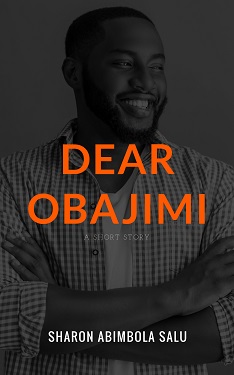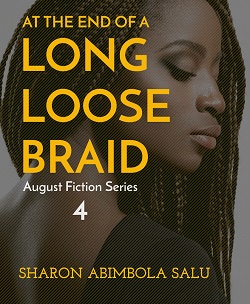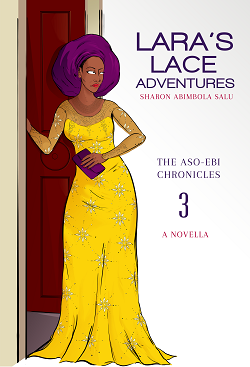First of all, Happy Mid-December! I missed wishing you a Happy New Month. This is the next best thing. 🙂 Today, I will be sharing the next (overdue) episode of our ongoing Nigerian romance story, Falling in Love With My Best Friend. If you missed all the previous episodes, you can start with Episode 1. In this episode, Tokunbo and Enitan finally get to talk and we see what happens afterwards.
Thanks for your patience. Have a great week! 😀
Episode 7: Can We Talk?
Regardless of what I should or shouldn’t have done, the fact remained that I had scheduled an appointment with Tokunbo Williams for Monday afternoon at 2:00pm.
Unlike the pre-delivery stage with the letter Tokunbo’s father had written, where I agonized for hours over what to say and how to react to what I imagined Tokunbo’s reaction would be, this time it was different.
This time, I realized that the ball was literally in his court, and my concern was what he had to discuss with me.
What was so important that Tokunbo wanted to tell me that had to be done out of the ear shot of both of our families? That was how I saw his choice of a venue: a convenient location, a neutral meeting place.
The Mallam at the junction of Alhaja Gbadamosi Street was what I would describe in general terms as a “sad sack.” He wasn’t bad-tempered, but he was certainly not jovial or friendly either. Most of us liked to patronize another Mallam farther up the street, who, in addition to selling conveniences, also had an infectious sense of humor.
However, the Mallam whose stall Tokunbo had chosen for our meeting, was different. He was very officious, did not laugh at jokes, at least while I was there by myself, and certainly did not make jokes. Ordinarily, this should have hurt his business, but as it turns out, humor is not necessary to succeed in business.
What this Mallam lacked in personality, he made up for it with business savvy. He had a tendency to stock items that were difficult to access locally or at convenience stores, and particular brands that people often had to travel to special markets to purchase.
Apart from stocking popular brands, he would have less popular yet durable brands of goods on hand, and would patiently explain why this other brand was justified in being ₦10 naira more than the one you came to purchase.
By the time you left his stall, he would have made a compelling argument for why you would be a complete fool to forego the opportunity to purchase a less popular, but in his opinion, better quality product.
For example, if you came to buy razor blades, and expressed surprise when he pulled out a pack of razor blades that was not the typical brand whose logo was a large, predatory cat, he would tell you something like:
“This one strong pass that one,” in a heavily accented voice, and proceed to demonstrate by attempting to slice a piece of leather with the brand of razor blades you came to buy. As the blades shattered to pieces before your very eyes, he would say:
“You see am! I talk say e no strong reach this one.”
Then, he would bring out another razor blade, the “this one” he was referring to, and attempt to slice through the same piece of leather. As it glided through the leather like a knife through butter, separating piece from piece, it was not unusual for the customer who watched the entire show with child-like wonder, to halt his demonstration, absolutely convinced, and buy more than the quantity of razor blades he needed.
But for those who were more brand-loyal, it did not matter if Mallam claimed that this new, less popular brand was the Swiss Army knife of razor blades. Once he did not have the specific brand they requested, they would simply walk away and hunt for it elsewhere.
So, his stall was a Mecca of sorts.
In addition, he was also a skilled cobbler. His stitching on leather was almost as neat as the machine-made stitches on commercially manufactured footwear.
But I did not learn his name, until that afternoon.
Having told my parents that I was going to buy something from the Mallam, which was partly true, I left the house wearing one of the few house wears I owned. It felt odd walking down the street on a week day dressed in mufti when normally I would have been wearing my school uniform.
The perks of holidays.
Inasmuch as the long, green floral short-sleeved dress, which stopped mid-calf, was indisputably mufti, it certainly did not qualify as a baff. In fact, if the dress was any longer I risked getting named “Mother Mary.” All that was missing was a scarf tied haphazardly on my head to complete the saintly look.
The Mallam’s stall was a good 10-minute stroll from my house, at a leisurely pace. A brisk walker would make the same journey in 8 minutes, with 2 minutes to simply chill.
So, when I turned the corner from our street and came upon the Mallam’s store at about 1:57pm, and found Tokunbo standing there, chatting with the Mallam, who we sometimes called aboki, the first thing that came to my mind was:
“He walks fast.”
I arrived at that conclusion because while Tokunbo was chatting with the Mallam, I could hear shallow panting, the kind that suggests that this person is trying to catch his breath.
And when I came close enough to Tokunbo to run my hands through his hair or graze his cheeks with my fingertips, neither of which I did in spite of the strong urge to do so, I saw a few drops of sweat gathered on his brow. Being that aboki‘s wooden stall was shaded from the sun, I concluded that Tokunbo was a brisk walker, and had arrived just minutes before I got there.
Turning to the Mallam who just moments before I arrived, had been chatting and laughing happily, but had clamped up and resumed his typical gloomy expression as soon as he saw me, I said:
“Aboki, Good afternoon o,” and then I added, “Well done,” when he nodded and picked up a shoe, whose sole he had been stitching. It was obvious that this shoe, part of a pair of lady’s peep toe shoes with clunky heels and made of cheap leather like the type typically purchased under the bridge at Apongbon, was brand new.
But the workmanship of shoes like these was such that just like a pregnant woman’s due date for delivery, one could predict with amazing accuracy, the date when the soles would separate from the shoes, making them resemble a reptile with a perpetually open mouth.
To preempt all of this, it was common practice for concerned shoe buyers to take brand new leather shoes to their local cobbler, who would then stitch the soles, thereby forestalling the wear and tear those shoes were guaranteed to suffer.
It appeared that Mallam was in the process of carrying out this preservation technique on somebody’s pair of shoes when I arrived.
Tokunbo smiled when he saw me, and after Mallam resumed his work, he said:
“You’re early.”
“Look who’s talking,” I said, looking at him with an expression that said, “You got here before me.”
Tokunbo must have been well-trained in reading women’s facial expressions, or at least, mine, because he responded with:
“I didn’t have anything else to do.”
Pointing to a bench in the shade, he said, “Come and sit down.”
I obeyed.
The part where we sat was set aside from the road, towards the back of the shade, so that people walking past could actually see us. A few people walked past. The adults gave us questioning looks until they saw Mallam, who acted as our chaperone. Two girls in particular came over, peered into the stall, and then giggled, as they pretended to buy some cheap eatables like chewing gum or candy (“Baba Dudu”). While Mallam was attending to them, they whispered to each other, eyes on us, and kept giggling.
Tokunbo acknowledged them with a “Wassup!” and nod, and when they left, I asked if he knew them personally, to which he responded in the negative.
“And yet, you greeted them? Why?” I asked, wondering if perhaps, the people in school were mistaken about this fellow.
Tokunbo just shrugged and offered no explanation.
Then, he went directly into the topic that had brought us into Mallam’s stall on a Monday afternoon.
“I wanted to tell you something,” he began, turning slightly to face me in the stall. Mallam turned on a small transistor radio that had to be battery-operated because I did not observe any electrical cord linking it to a hidden electrical outlet. The radio station, which was probably an AM station judging from the muffled sound coming from the speakers, played music sung in Hausa, by one man and several women in a call and response manner. Essentially, the man sang, and the women echoed his lyrics in chipmunk-like voices.
Every now and then, Mallam would sway and nod and sing along. I would have loved to know what they were saying, but at that particular moment, more pressing matters demanded my attention.
“Yes, I know that already,” I said impatiently.
Then, so that he wouldn’t think hanging out with teenage boys on weekday afternoons was something I was accustomed to or a hobby of sorts which I relished, I added:
“Can you hurry up please? I don’t want my parents to start asking for me.”
“Okay, okay,” said Tokunbo, leaning back against the wall of the wooden stall. It was the closest thing to a back rest, and he seemed to appreciate it, because he let out a relaxed sigh, before continuing.
“First of all, I wanted to say ‘Thank You’–” he began.
“For what?” I interjected.
“For giving me my father’s letter. Unopened.”
“How do you know I didn’t open it, read it and quickly glue it back, ehn?” I asked, mischief written all over my face.
“Because you wouldn’t have told me about it just now, if you did. You would’ve been careful to keep those details away from me.”
I looked at him in surprise. Where was this guy going with this analysis?
“Okay o, Mr. Analyzer. Since I didn’t read it nko, na wetin?” I asked.
“I wanted you to get a chance to read it yourself. It seems unfair that you would deliver a letter without knowing the contents,” said Tokunbo reaching into the pocket of his trousers and pulling out a folded piece of paper. He gently pushed it towards me, but I refused to take it from him.
I couldn’t believe what this boy had just said. What was my business with the contents of his father’s letter?
“See me see trouble o! Isn’t that what postmen do all the time?” I asked, my face matching the confusion in my voice.
“Are you a postman?” said Tokunbo.
Without waiting for my answer, he added, “If you are, then you’re the cutest postman I’ve ever seen.”
I blushed deeply. At the same time, I felt anger rising in my chest. Did this guy really think I was the sort of girl he could use to practice cheap lines like this?
“Ehn … Come, come, Tokunbo. Leave cuteness out of this o! I’m not interested in your letter. Whatever is inside it is your business!”
“Ahn, ahn! Why now?” said Tokunbo in an exasperated voice.
“It seems you’re just here to waste my time,” I said, making as if to get up and leave.
Of course, all of this was just shakara. I knew I was not going to leave without hearing him out. But at least, this way, he stayed on his toes, and would stop beating about the bush.
“Oya sorry. Sorry. Sit down. Please,” he said.
I obliged, pretending to still be annoyed. The truth was that I was itching to read that letter, but I didn’t want to look desperate. Instead, I wanted him to insist.
He did.
I took the letter from him and began to read it aloud.
“Dear Tokunbo, I–”
“To yourself, please,” he urged, hushing me. “Read it in your mind,” he added, with pleading eyes, before glancing sideways at Mallam, who regarded us with the same air of dismissal he gave the rolls of Baba Dudu, hanging from a nail on the wooden window.
I complied with Tokunbo’s request, and read the letter silently.
It was very short, but packed with enough details to spark more questions, questions whose answers could not be contained within the tight constraints of a single ruled page.
It read:
Dear Tokunbo:
You will probably hate me after this, but I promise, I am doing this for your own good.
I will be travelling back to Kaduna on Tuesday for business and I won’t be back for several months. I will try and call you at home, but I strongly suspect that your mother will ensure I don’t get to speak to you.
I wanted you to know that I enjoyed visiting you at Ijanikin. Those were some of the happiest moments of my life, some of the dearest memories I have with you.
I wish things were different and that your mother and I were still together, but I have spent too many years wishing for change to know that wishes don’t always come true. I will let you know exactly what I am up to in the coming days.
Tokunbo, listen to your mother. She wants the best for you. And face your studies. There is no substitute for a good education. The world is waiting for you. And so am I.
Be good.
Your Daddy,
Oladipupo Williams
As soon as I had finished reading the letter, I looked up from the spread out paper in front of me to come face-to-face with Tokunbo, who was looking right at me, a worried expression on his face.
“You’ve read it, abi?” he asked, as I handed the letter back to him. “What d’you think?”
“I think this is a private matter and you should sort it out between you and your father. Leave me out, please,” I insisted.
“But that’s the thing, Enitan. I can’t.”
“Why not?”
“Because whether you like it or not, you’re already involved.”
I could not hide my surprise. What on earth did this guy mean?
“Tokunbo, I don’t know what you’re driving at, but I don’t even want to know.”
“Don’t you see? My father has never written a letter to me before, and he would never leave it in the hands of someone he didn’t trust.”
“But I just saw him at the gate. It could’ve been someone else.”
“Yes, but it wasn’t. Look Enitan, if my father entrusted this letter to you, then it means I can trust you too.”
I laughed to expose just how ridiculous his notion was, but it didn’t shake him.
“You’re serious?” I asked, before bursting into another round of laughter.
“Yes. And why are you laughing?”
“Because you must be joking!” I shouted.
It was loud enough to startle Mallam who gave a 32-second speech about how we could not make noise if we chose to sit with him.
“No noise for here, you hear? No noise!” he said, finally ending his speech.
After we both apologized profusely and promised to be more discreet, we continued our conversation in quieter tones.
“I’m serious,” said Tokunbo launching the next round of our conversation. “Anyway, I couldn’t sleep last night after reading the letter at you people’s house, and I needed someone to talk to.”
“And that person is me?” I asked in an incredulous tone. “Why? Isn’t this the sort of thing you discuss with … I don’t know … An adult … Or at least, an older person?”
“How old are you?” asked Tokunbo.
“Old enough to know not to interfere in family matters. Besides, don’t you know you shouldn’t ever ask a woman her age?”
“You’re a girl, not a woman,” said Tokunbo in a matter of fact voice.
“I’m not a girl. I’m a … young woman,” I protested.
“Okay o, Young Woman Enitan, what if I’m not asking you to interfere? Just hear me out.”
I wanted to ask him why he didn’t discuss this with Yele or his mother or even their househelp or any other female relative, or acquaintance or friend.
In short, anyone but me.
But I could tell that it would be a colossal waste of time. I decided to just hear him out.
“Please, just listen. Ignore everything I’ve said. I just need someone to share this with and your name kept popping up,” he said, pleading with his eyes.
“Okay. I’m listening.”
He smiled, and began.
“My father and mother, separated when I was 5 years old. That was 10 years ago.”
In my mind, I was doing a mental calculation of his age.
Tokunbo was 15 years old.
“–Ever since then, my relationship with my father has been … in fact, just trouble.”
I looked at him with eyes that said, “This is not new information.” But he continued and said:
“Yes, but a few months ago … In fact, just some weeks after we started this first term in school, he just showed up in my school. After disappearing for two years. No phone calls, nothing,” said Tokunbo in an icy tone.
“Did your mother know about this? About his visit, I mean.”
“No. I didn’t tell her. He said I shouldn’t tell her, that she’s the one who has been keeping him from talking to me since.”
“And you believe him?” I asked.
“My father may be many things, Enitan, but he’s not a liar. Besides, shebi you know how my mother is–”
I nodded.
Mama Tokunbo was a drama queen, for sure, but I couldn’t figure out why she would want to keep her only son away from his own father.
“So you think your mother kept your father from having anything to do with you?” I asked.
“Yes. But, I just don’t know why.”
I paused and remembered a family friend whose parents had recently gone through a nasty divorce. The first lesson I had learnt from their story was this:
There are two sides to every story. Don’t be quick to believe or judge one party before hearing from the other party. The person you think is right may end up being the wrong one when you have all the facts.
Mr. Williams had given Tokunbo his own version, but none of us had heard his mother’s version. And there was no hope of hearing from her anytime soon. Certainly not that afternoon.
“Don’t draw any conclusions until you’ve spoken to your mother about it,” I advised.
“But that’s the thing. Should I even tell her? She won’t understand.”
“Try her,” I urged. “She’s your mother, and wants the best for you.”
“Doesn’t seem like it sometimes,” he shrugged. “Anyway, in school, when my dad would visit, I would have these–”
“Mixed feelings?” I offered.
“Emmm … Sure … Sort of … Mostly anger. I wanted to shout at him, abuse his life, but at the same time, I was happy to see him. Happy he was even alive. You know some people aren’t that lucky.”
“True.”
“So, we talked and I told him how I felt about him. And … he took it well. Said he would try to fix things. Patch things up with my mum.”
“Wait a minute, Tokunbo. Did you father re-marry?”
“Umm … No. No. But he lives with a woman in Kaduna.”
“They’re not married though?”
“No. They’re not,” he said firmly shaking his head.
“Does he have other children?”
“As far as I know … No.”
“And yet, he didn’t try to communicate with you for two years? You, his only son?”
“That’s what my mum led me to believe–”
“–Until he showed up again, abi?”
“Exactly.”
“You need to talk to your mother. I don’t think she’s telling you everything. Maybe she’s keeping some things from you.”
“But why? Why would she do that?” Tokunbo asked perplexed.
“To protect you, maybe. Just talk to her.”
“Okay.”
Then, we both fell silent. I believe Tokunbo was quietly turning over my advice in his mind, weighing it against the things he already knew, trying to decide if my advice was sound.
I didn’t blame him.
I myself wondered if I hadn’t gone too far. For heaven’s sakes, I had practically accused his mother of proactively trying to extinguish the smoldering wick that was the relationship between Tokunbo and his father.
“The thing is … He came to visit me just four times, and he said he’d make it more frequent, more regular. And then–” here, Tokunbo let out a deep sigh, “–He never showed up again, until I guess, the day he gave you that letter. I was angry … Waiting for him … I took out my anger on everyone … anyone,” he said clenching his fists subconsciously.
I watched him quietly, providing the listening ear he needed. In my own mind, I was connecting the dots. It had to be that it was when his father suddenly disappeared and failed at his promise to visit that Tokunbo got into fights in school, the fights which had stirred Mama Tokunbo into action, inciting her to recruit my own father to mentor her son.
I saw some of the missing links in the chain, sitting in the cool shade of Mallam’s stall.
Then, out of the blues, Tokunbo said:
“Sorry … I didn’t even offer you anything. Just pick anything–” he said nodding towards Mallam’s spread of sweets, biscuits, cheap chocolates, and other handy snacks. “I’ll pay for it.”
“No, thank you,” I began until I remembered what I had told my parents: that I was going down the road to buy something.
As at that moment, I had bought nothing, but my ears were full of plenty.
“I might as well execute the original plan,” I reasoned within myself, before accepting Tokunbo’s original offer.
Pointing to a pack of biscuits I had never seen before, I asked Mallam if they were any good.
He nodded.
That answer did not satisfy Tokunbo.
“Haba, Mallam Audu! You sure say this one sweet?” he asked in a voice that did not mask his doubt that those biscuits were worth eating.
That was the first time I heard the name of the Mallam I had visited several times.
Audu.
Somehow, knowing his name made him less of a stranger.
Mallam nodded in response to Tokunbo’s question, and added:
“Dis one sweet pass am,” he said pointing to another set of biscuits, not far from the ones I had initially picked.
“Enitan, you better buy the one Mallam recommended. You won’t regret it,” said Tokunbo assuredly. I looked at both of them wondering if perhaps Mallam personally sampled those biscuits before attesting to their sweetness. His tall, slender frame did not suggest that he was a heavy snacker, but then, a fast metabolism isn’t written on anyone’s face.
“Why not?” I said quietly, before asking Mallam to wrap two packets of biscuits for me.
Tokunbo was about to say something else to me when a stout, muscled man stepped into the shade and said he wanted to buy a particular brand of cigarettes. Mallam attended to this man after collecting Tokunbo’s payment and handing his change back to him. He also bought Tom-Tom, a local peppermint often used to mask the hard-to-miss smell of tobacco that was sure to follow his smoking session.
As we prepared to leave, Tokunbo spotted a friend strolling farther up the road, and called out to him. The said friend was headed towards us, but I didn’t wait for him to reach us. I just told Tokunbo I would see him later and walked away.
As I munched my biscuit on the journey home, I praised Mallam Audu’s good taste in my heart.
But far sweeter than the biscuit was the memory that now, I knew that Tokunbo and I were no longer strangers.
We were friends.
As soon as I entered the house, I prepared my excuse for my mother, but she did not even ask me where I had been or why it had taken me an hour to buy something down the road. The biscuit must have been my free pass to a “no questions asked” passage to the house. Aside from the regular household chores, no one bothered me all evening.
The following day, my mother informed me that she would be going to the market to buy a few items. I offered to come with her, but she refused, saying she wanted me to enjoy my holiday, and she could manage on her own.
Before she returned however, she wanted me to prepare Banga soup for dinner. The ingredients were already in the kitchen.
“No wonder she didn’t want me to come–” I grumbled. “She wants me to slave over this meal before she gets home. And these boys are just sitting there, doing nothing. So unfair!”
I grumbled and complained as I rinsed the fresh palm nuts and then boiled them for some minutes.
While they were on the fire, there was a knock on the gate. It was Tokunbo.
I knew this only because Yemi went to answer the gate and I heard Tokunbo tell him that he had come to see my father.
“He’s not around. But he should be back soon,” said Yemi as they walked from the gate. Tayo had taken a bathroom break when Yemi went to answer the gate. So, the sitting room was quiet for a few minutes.
Just a few minutes.
“Okay, I’ll wait for him,” Tokunbo said to Yemi.
I heard them enter the house and go to the sitting room where the sound of video game playing resumed.
Somehow, amidst the noise, Tokunbo must have asked, “Where is your sister?” and either Yemi or Tayo must have pointed in the direction of the kitchen.
That must have happened, even though I did not hear it happen.
But what did happen was that one minute, I had lifted the lid of the pot to look at the boiling palm nuts, and the next thing I knew, as I went to retrieve a wooden spoon, I came face-to-face with Tokunbo.
I screamed in fright.
“Oh, I’m sorry! Sorry, I didn’t mean to scare you,” he apologized, diving to the ground to pick up the spoon I had knocked down in my fright.
“You scared me!” I half-shouted, half-hissed at him. “I didn’t see you standing there,” I added, stating the obvious and increasing Tokunbo’s guilt from 60% to well over 90%.
“Sorry … Sorry,” he repeated, handing the newly-rescued spoon back to me. I felt a bit embarrassed because the kitchen was messy. I was in the process of assembling the ingredients for banga soup. The atariko seeds were in a dry blender. A wooden chopping board lay on the countertop, with raw beef, shaki and kpomo nearby.
Then, somewhere in the midst of this chaos was the onion I had peeled, but had not chopped, some garlic, maggi, salt, ground crayfish and those other ingredients that combine to make a delicious pot of banga soup.
Now, it was my turn to apologize.
“I was … I mean, I am cooking. That’s why this place is–” I began, my eyes wandering all over the kitchen, accusing it for not being perfect and orderly in anticipation of Tokunbo’s visit.
“Oh, no problem. What are you making?” said Tokunbo eyeing the assembly of ingredients with the curiosity of a child.
“Banga soup,” I replied hastily, as I walked over to the sink to wash the wooden spoon. Then, I went to stir the boiling palm nuts.
“Do you need any help?” Tokunbo asked, walking to where I stood, replacing the lid on the pot with the palm nuts. “It looks like a lot of work.”
“Really? You–” I began, pointing at him, “–want to help me?” I said, finally pointing back at myself as if Tokunbo needed any help distinguishing me from him.
“Of course. It should he fun.”
I laughed and almost snorted, amid pitiful head shaking.
“Only a person who doesn’t cook regularly would use the word “fun” in the kitchen,” I said rolling my eyes at him.
“But it is,” he insisted. “Change your perspective jo! Besides, it’s faster when two people are getting the food ready instead of just one person,” said Tokunbo.
“True. I’ll change my perspective when I see you spend endless hours in the kitchen. Alone. Every single day,” I said with a wicked grin.
“Emm … I don’t know about that o,” said Tokunbo, reconsidering his own advice. “But I can help you today sha.”
“Okay … Like my mother says, Make yourself useful.”
“I am at your service, my lady!” said Tokunbo, mock bowing.
I giggled.
“First of all, you will need to wear an apron,” I said, going to the cupboard where my mother stored aprons, napkins and linens. “We don’t want banga soup all over your fine shirt,” I said, grinning mischievously as I pulled my mother’s old apron from the cupboard.
It had a faded yellow and black flower pattern. As I tossed it to Tokunbo, I watched in satisfaction as the look on his face changed from enthusiasm to horror once he saw the ultra-feminine apron I had picked for him. His eyes widened in disbelief and he threw the apron on the kitchen table with such speed and disgust that for a moment, I thought it had caught fire.
“I’m not wearing that!” he protested shaking his head as he spoke. “And you’re not even wearing one so-o–”
I laughed again.
“Cool down jo … I was only testing you. You don’t need to, but it would look cute on you, bring out the color of your eyes and I could take a picture of you in the apron for your yearbook!” I added before cackling with laughter.
“Ha, ha, ha!” said Tokunbo, dryly. “It’s always funny until someone does it to you.”
“Okay … Oya, make yourself useful,” I said as I suddenly realized I was running behind schedule. My mother would not be pleased to enter her kitchen and see Tokunbo there. According to her, guests did not belong in her kitchen. And last time I checked, Tokunbo was not a member of our family. She would be even less pleased to see that dinner was nowhere near being ready. I had to hurry things up.
“Tokunbo, you can start by chopping those onions for me,” I instructed, waiting to hear if he would protest with “You’re not the boss of me,” like Yemi usually did.
No way.
Tokunbo got busy with a knife and chopping board. I wasn’t sure how much experience he had had with a knife, so I gave him a knife that was not particularly sharp. I certainly didn’t want to witness him chop off his fingers in our kitchen.
He managed quite well, slowly cutting the onions into medium-sized cubes, which told me that he at least knew how to chop an onion and was not a complete stranger to the kitchen.
As I cut the beef, shaki and kpomo, I looked over at Tokunbo every now and then, watching him work.
“So who taught you how to use a knife?” I asked as my own knife cut through the thick brown cow skin with zero nutritional value. The accusation in that question was deliberate and I waited eagerly to hear his overly-defensive answer.
He did not disappoint.
“Is that a joke?” he asked, looking up briefly to catch me looking at him. I looked away smiling, waiting for his answer.
“Yes now. You’re chopping it well. So, who taught you?” I asked again resuming my kpomo cutting.
“I didn’t learn it from one person, but between my mother, aunties and all our househelps, I’ve learnt how to use a knife without losing a finger.”
I turned around to look at him and caught him with a smirk on his face. He added:
“And this one you gave me–” he said holding up the brown plastic-handled knife, “–isn’t even sharp enough.”
“Ah, you noticed?” I asked with unsuppressed shock coloring my voice.
“Yes, I did. Reminds me of my mother. Always protecting me from God knows what.”
“Is that so?” I said, moving on to the shaki. Tokunbo had finished chopping the onion by now and stood waiting for the next set of instructions from me.
“Yes, she does it all the time. Speaking of which, remember what we discussed yesterday?” he said, walking over to where I stood cutting the tripe into pieces.
“Yes,” I said, turning off the heat and transferring the nuts to a bowl where I put them in water and started squeezing them with my hands until I had separated the soft flesh and husk from the hard shell of the palm kernel nut. The water was now a deep orange with the nuts now mostly black, exposing the hard shell.
Pausing his mother’s gist briefly, Tokunbo said:
“Ehn-ehn! You reserved the fun part for yourself ehn? Oya, me too I want to crush nuts!”
I almost knocked over the bowl holding the precious half-processed palm nuts submerged in orange-colored liquid, in my bid to hold my belly as I burst into laughter.
“Crush nuts? Really, Tokunbo?”
“Na you get bad mind o … I know what I was talking about.”
“Okay jo … Mr. Nut Crusher, come and do your work,” I said stepping aside.
But he said:
“No, let’s do it together. I’ll just join you.”
And so in a surreal moment, I dipped my hands in the bowl, grabbed a bunch of palm nuts and rubbed them against each other, pressing hard with my fingers till the flesh fell off the hard shell. Tokunbo did the same.
Unfortunately, he over-estimated the amount of aggression needed to rub the nuts together, and a few of them rolled out of his hands and scattered on the countertop.
After we retrieved them, he adjusted the level of pressure applied and between the two of us, we ended up with the palm nut base which we needed for the banga soup.
I got a sieve and separated the husk and nuts from the liquid after extracting even more concentrate with warm water.
“What do you do with the nuts?” he asked.
“You can pound them, break the shell and eat the nuts. But not now–”
“Later, abi?” asked Tokunbo expectantly.
“Right.”
Between the two of us, the meat, shaki and kpomo got seasoned and cooked. And within an hour and a half from Tokunbo’s arrival, the banga soup was ready.
“Now, you really must join us for dinner, since you helped cook the food,” I said as I tasted the soup for salt one last time before turning off the heat.
“That would be nice, but maybe another time. I think your parents should invite me.”
“You’re probably right on that one,” I agreed.
In all the time we were in the kitchen, my brothers took turns coming to peep at us and check out what we were up to. They did this a few times, and once or twice, they even enticed Tokunbo to come and join them in the parlor where they were playing Mortal Kombat.
But, on each occasion, Tokunbo declined their invitation.
Interestingly, they also declined my invitation to join us in the kitchen.
Meanwhile while we cooked the food, Tokunbo told me how he had confronted his mother, and how she admitted to keeping his father away from him for the past two years because he had announced his intention to marry another wife.
“We had a big argument. Right now, she’s not talking to me,” he said concluding his update.
“Is that why you came here?” I asked, wondering if I would always be listening to Tokunbo’s family woes, always caught in the middle, playing referee. At least as to Tokunbo, not to his parents.
“No, your dad asked me to see him today for another mentorship session. He said he wanted to share some lessons he learnt from his childhood with me. And I wanted to tell him that my mum has enrolled me in a new school, a private school. St. Patrick’s College.”
The name of the secondary school Tokunbo would start attending in January was completely unfamiliar to me. But at least, he would be a day student not a boarder.
“And she also said I’m to start JAMB lessons in January,” he added.
“But you’re just in SS1, right?”
“That’s what I told her, but she said the earlier the better. You know how people fail that exam.”
I nodded. The tales of re-taking JAMB were all too familiar, having heard them from just about everyone I knew: classmates, friends, complete strangers.
The fear of JAMB was real.
“That’s funny. I’m also attending JAMB lesson. And I’m also in SS1,” I said chuckling. “Which one will you be attending?” I asked.
“Future Champions Academy,” said Tokunbo.
I froze.
That was the name of the same JAMB lesson I attended.
<<READ EPISODE 8>>










Love in the time of adolescence.
Very long post. And God knows I love a man (boy) who is happy to help in the kitchen.
Great meaty addition by the way. And setting p means making a date. It’s usually used if your intentions are less than honourable though.
Uju: Abi o! Love in the time of adolescence is apt, or should we call it “puppy love?” 🙂
I think most of us ladies appreciate men who “willingly” help in the kitchen instead of those you have to drag by the ears.
Thank you so much for explaining what “setting p” means. 😀 Next time I hear someone say it, I’ll remember: “Uju taught me this. Clueless no more!”
Thanks for reading and have an awesome weekend! 🙂
Hi Sharon,
How are you doing? This was sweet and long, made the wait worth while.
Awww, young love. Tokunbo is so well-behaved. I always assumed that he was in a class at school ahead of Enitan’s.
Almighty JAMB! The fear of that exam was the beginning of wisdom.
Mallam Audu is hilarious. You were referring to Tiger razor blades, right?
I had an aboki in my childhood that I will always remember fondly- His name is Ibrahim. His wooden stall was every child’s delight- Bazooka, Goody-Goody, Okin Biscuit, Trebor peppermint. Parents would appease their crying children with “Sorry, stop crying, I’ll take you to Ibrahim’s shop”. 😀
Ah! The way you described the banga soup preparation has made me crave for some. Lol
@ “The world is waiting for you. And so am I” is very heart-warming.
Compliments of the season my dear!
Nedoux: I dey o! I’m glad the wait was worth while. 🙂
No, Tokubo and Enitan are in the same class but he’s older than her. I guess I need to make that clearer. 🙁
Oh, I almost used those very words you used for JAMB in this episode. Lol! Nothing but fear was associated with JAMB. It deserves a whole book, honestly.
And yes! It was Tiger razor blades! 10 over 10! Oya, clap for yourself. 😀 What gave it away? Hehe!
You reminded me of bazooka! Especially at this time of the year. And Goody-Goody …
“The sight (or side?) of the wrapper
Makes your mouth water ….
So Chewy chewy
So Goody-Goody”
I couldn’t resist. 🙂
Banga soup made with love is an experience. *smacks lips*
Compliments of the season to you too! Thanks for reading and commenting.
This wonderful..you are a very wonderful and beautiful writer. Weldone!
Pelumi: Your comment put a very big smile on my face. 😀 Thanks for your sincerity and kind words. I appreciate it plenty!
There’ll be more. Visit often. 🙂
To be young and in love! Just remembering all my crushes from coaching lesson! This was a lovely read..
Amarachi: Nicely put: young and in love. Just reading it made me grin. 🙂 Ah, crushes from coaching lesson, ba? What would teenage years be without crushes? *giggles*
Thanks for stopping by, Amarachi. Glad you enjoyed this episode.